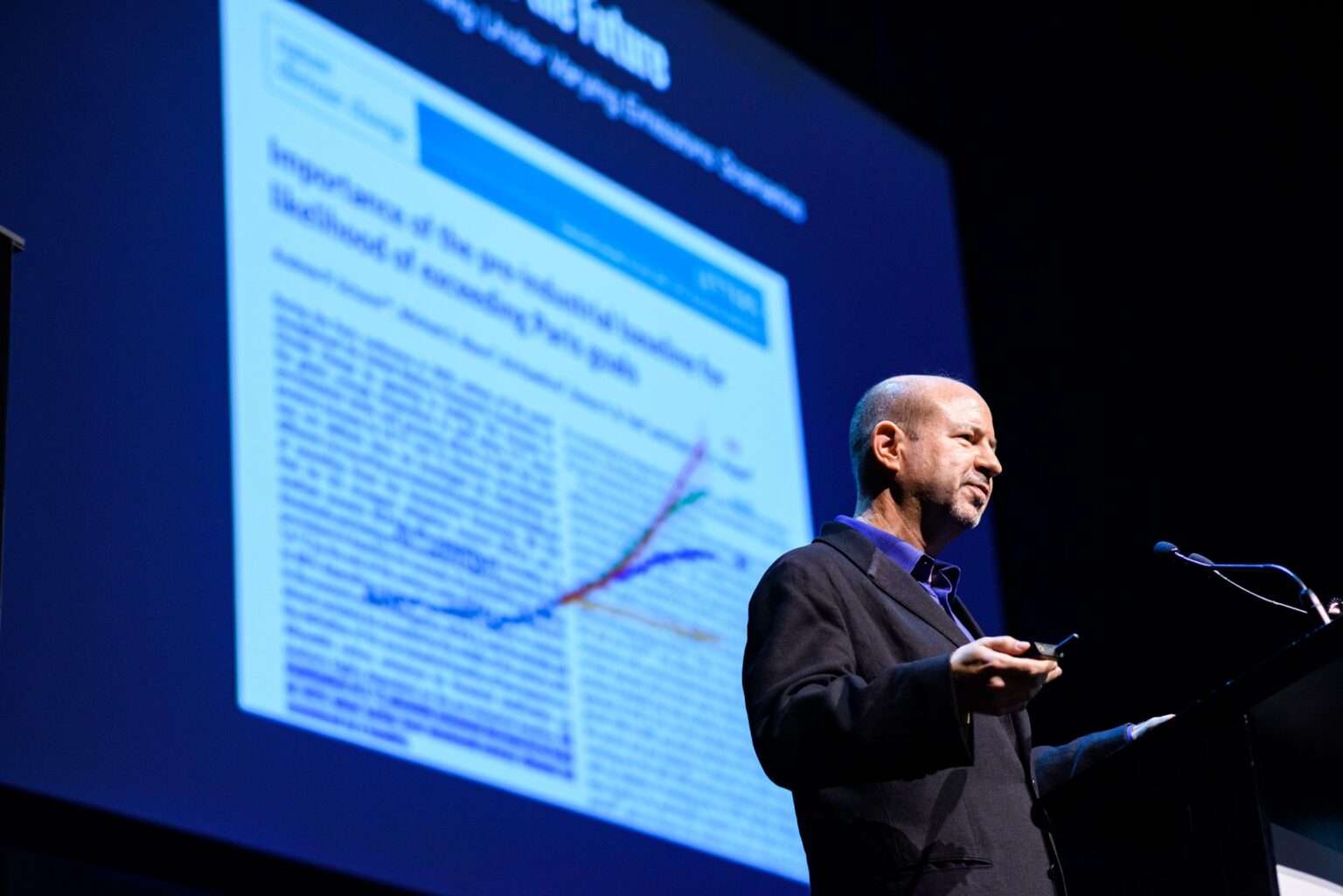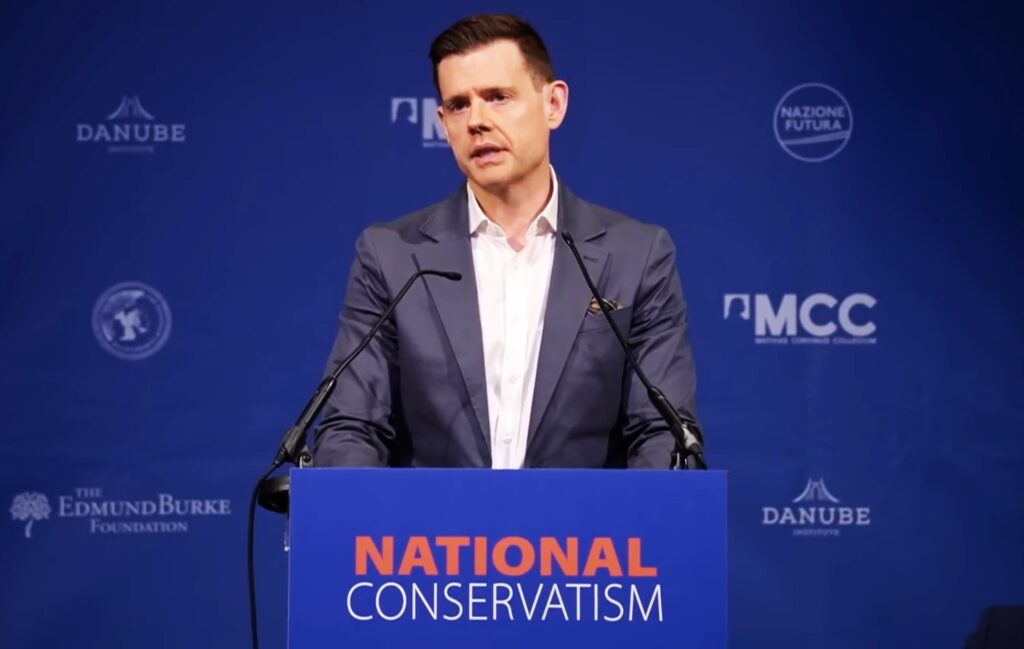On Monday, conservative blogger Mark Steyn wrapped up his confrontational cross-examination of Michael Mann, the climate scientist who is suing him and another climate denier for defamation in Washington, D.C. Superior Court.
Steyn appeared determined to portray Mann, currently the Distinguished Professor of Earth and Environmental Science at the University of Pennsylvania, as untrustworthy and deceitful, in an aggressive manner suggesting that more than a decade of litigation in this case has done little to dampen his contempt for Mann’s allegations, or for the science of climate change.
It was Mann’s fourth and final day on the stand.
As DeSmog has previously reported, in 2012 Mann sued Steyn and Rand Simberg, another right-wing writer, charging that their attempts to discredit his work in print and online had damaged Mann’s reputation and led to a decline in the scientist’s ability to secure research funding.
In a 2011 blog post for the Competitive Enterprise Institute (CEI), a conservative think tank that has long espoused climate science denial and delay, Simberg stated that Mann had “molested and tortured data,” comparing him to Jerry Sandusky, the former Penn State football coach imprisoned for child molestation. Steyn, who was then a regular guest on Fox News, quoted and amplified Simberg’s charges in the National Review, a prominent conservative magazine.
Steyn is representing himself at the trial, while Simberg’s attorney is from the corporate law firm BakerHostetler. Both the National Review and CEI succeeded in removing themselves from the lawsuit in 2021.
In his questions on Monday morning, Steyn made repeated attempts to spin an answer that Mann had provided earlier in the trial as a “patently untruthful” evasion.
Echoing a line of questioning by Simberg’s attorney the prior week, Steyn suggested that Mann’s written responses to questions from the defense were deliberately misleading because they did not list other online articles that criticized his work, by writers who Mann did not subsequently sue for defamation.
Mann termed the issue a “misunderstanding,” testifying that his team had not believed they needed to disclose those articles, in part because they had interpreted the question differently from what Steyn had apparently intended.
These articles included a 2011 blog post by Ann McElhinney, a conservative journalist, titled “Jerry Sandusky and Michael Mann: Much in Common?”
Last week, in response to a question from Simberg’s lawyer, Mann said that McElhinney’s post had not caused him the same damage as Simberg and Steyn’s pieces, and that she did not “seem like anyone prominent.” Mann’s assessment prompted murmurs in the courtroom because (as one audience member whispered audibly) McElhinney has been attending the trial.
Defamation as a Defense
Last week, the heated exchanges between Steyn and Mann matched sweltering temperatures in the courtroom, which got hot enough to warp poster boards being used to display evidence. The conditions led Steyn to complain to the judge about “cruel and unusual punishment.” (The trial was moved to a different room on Monday.)
In testimony last week, Mann described the impact of Simberg’s and Steyn’s articles on his work and private life, including the financial and reputational harm he suffered as a result of Simberg’s claims.
“I had colleagues come and tell me I was a pariah,” Mann said.
Mann’s family was also affected. On the stand, Mann spoke of encountering “vivid” hostility from a stranger during a weekly shopping trip with his wife and then six-year-old daughter, regular outings that he had previously enjoyed. The experience had “damaged” that family tradition, Mann testified.
“I think we all, at some point in our lives, have experienced something like that,” Mann testified, describing the feeling of being a target of unprovoked hostility.
Over the course of his two-day cross-examination of Mann, Steyn has repeatedly aired climate denial theories out of step with modern research.
According to NASA, 2023 was the hottest year ever recorded. The agency’s head recently wrote, “NASA and NOAA’s global temperature report confirms what billions of people around the world experienced last year; we are facing a climate crisis.”
Simberg’s lawyer, Victoria Weatherford, has similarly delved into the archives of climate denial during the trial. Many of their questions have appeared designed to leave members of the jury doubting Mann’s credibility.
Seeking to demonstrate that other commentators had mocked Mann online without being sued, Weatherford last week chose to play a 2010 video by another climate denier alleging that Mann and other climate scientists had conspired to cover up evidence that average global temperatures were not actually increasing.
While the claim has been thoroughly debunked, it continues to circulate online. By playing the video during the trial, Weatherford has made it part of the official record of the D.C. Superior Court as well.
Some attendees, including members of the BakerHostetler defense team, smiled and chuckled as the video played.
“It looks like their defense in the defamation case is just to defame Dr. Mann even more strongly,” Bill Nye, a friend and supporter of Mann who has attended the proceedings, told DeSmog. “We’ll see. It’s up to the jury.”
The trial entered its next chapter on Tuesday morning, as the defendants — beginning with Simberg — took the stand.
Stay tuned for DeSmog’s ongoing coverage of the Michael Mann defamation trial.
Subscribe to our newsletter
Stay up to date with DeSmog news and alerts






